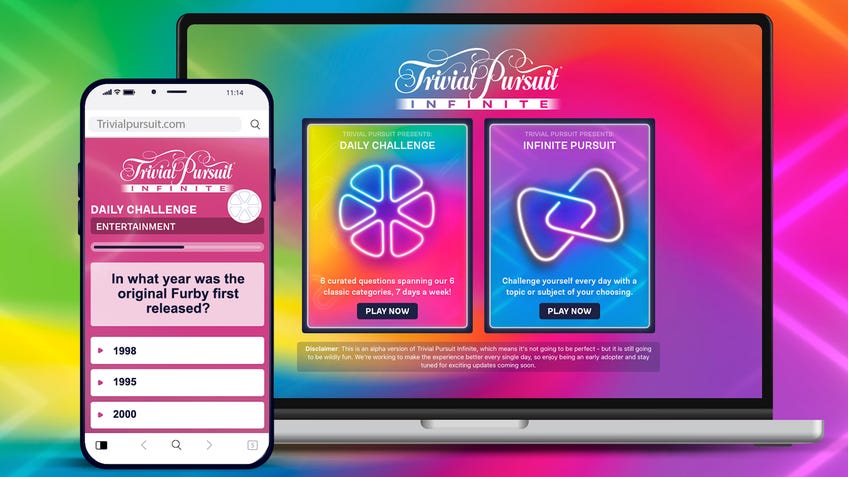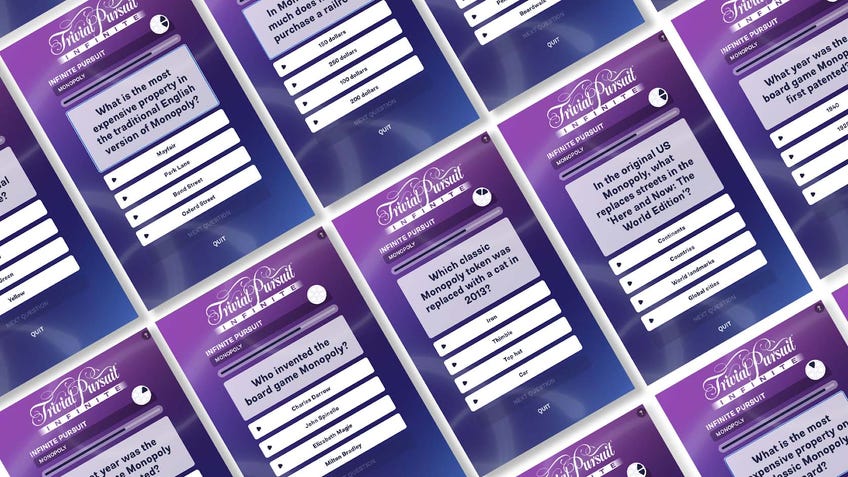AI-Powered Trivial Pursuit Infinite is a mostly harmless canary in the tabletop coal mines
New Infinite mode turns players into playtesters for Hasbro’s digital board game app.
Toy giant Hasbro recently announced an AI-powered version of Trivial Pursuit, a perfectly cromulent board game that everyone has played exactly once in their lives. Trivial Pursuit Infinite trades plastic wedges and cards for a digital app with questions cobbled together by aggregate data shoved through a Large Language Model program (think ChatGPT).
Hasbro dropped news of this web-based version of Trivial Pursuit on January 4th (apparently National Trivia Day in the US), explaining that players will have access to two different modes: daily challenges a la crosswords, Wordle and every other coffee-and-commute game. The other mode, Infinite, is where the AI program enters the scene, generating seemingly endless prompts for voracious quizzers.
Daily Challenges hews close to the classic Trivial Pursuit experience. Every day serves up a fresh sextet of questions from each of the board game’s categories - Geography, Entertainment, History, Art & Literature, Science & Nature, Sports & Leisure. Wrack your brain, don’t cheat by opening a Wikipedia tab, and then share your scores and streaks with people on Facebook.
Infinite mode is where things get interesting, turning on a conveyor belt of AI-generated prompts for as long as players can stomach the grind. Choose a category, no matter how niche, and Infinite will attempt to spit out brain teasers that ostensibly should match the human-created queries. Hasbro’s press release didn’t mention which LLM powers its new app, but the company would very much love players to rate their questions and flag any peculiarities that crop up.
That’s likely because LLM-powered AI - like its image-generating siblings - are imperfect engines that don’t create on their own so much as they blend existing information (text, in this case) into a slurry and then attempt to reconstitute the mess of data into human language. I say attempt because the results are still, for the most part, easily recognisable as machine output by the general public.
Gray Bright, vice-president of artificial intelligence and gaming innovation at Hasbro, told Forbes that the company has “invested in trying to understand how to effectively and ethically use artificial intelligence to help create great things for our players for over a year.” Trivial Pursuit Infinite apparently went from prototype to full release in the span of three months.

“These are still early days for using generative AI to augment the work of game designers,” Bright said. “At Hasbro we believe that human creators are at the heart of making great games and that new tools like generative AI can help unleash creators’ imaginations and help deliver brand new experiences that players will love.”
For now, Hasbro’s relationship with AI-powered tabletop games remains digital only. This nascent technology is rapidly improving beyond not understanding how hands work, and the company is clearly very keen to take advantage of production free from the pesky restrictions of human labour. Bright in his role as VP of artificial intelligence and gaming innovation survived Hasbro’s recent layoff of 1,100 workers, which cut across the flagging toy division and deep into Wizards of the Coast’s two golden geese - Dungeons & Dragons and Wizards of the Coast.
Those two brands have been caught flirting more with AI in the past few months, despite insistence from WotC that AI-generated material has no place in their creations. Many of those compromising situations arose from outside contractors, sure, but Hasbro growing interest, and explicit excitement, in AI-generated games leaves WotC looking foolish as the repeatedly bat away criticism from fans and players.


